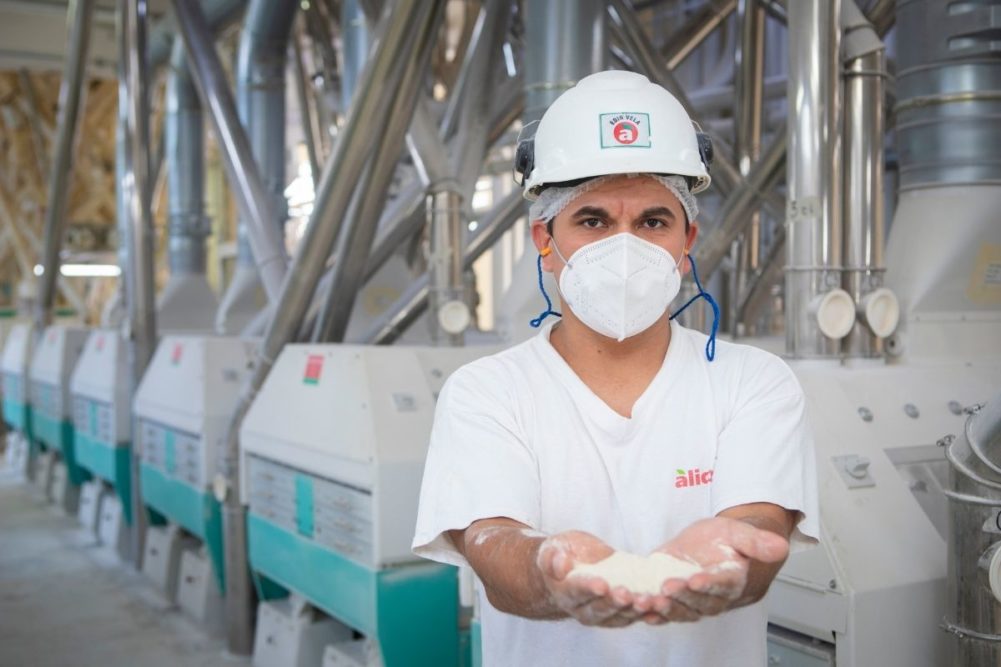|
|
LIMA, PERU — Alicorp SAA, Peru’s largest flour miller and a company with wide-ranging business interests, has expanded its flour production capabilities by nearly 50% at its plant in the Callao district near Lima, the nation’s capital. The plant now can produce 1,580 tonnes of flour (wheat equivalent) per day, an increase of 500 tonnes.
Oscar Narvaez, project engineering manager for Alicorp, said the nine-floor, 1,700-square-meter facility was expanded with an eye toward the future as consumption of flour-based products continues to increase in Peru.
“The expansion is due to the growth in demand (for flour products) in the coming years and to also improve our product quality and customer service,” Narvaez said.
The recently completed expansion, which was executed in existing space inside the building, includes a new milling line that features fully automated Bühler equipment that Narvaez said will increase milling yield while keeping energy usage low.
The project included the installation of 23 Bühler roller mills, 3 plansifters, an automated bagging carousel and an optical grain sorter.
Other highlights of the project are the erection of wheat storage silos, the installation of concrete silos for wheat conditioning, and a truck filling station for flour and byproducts.
Narvaez said the installation strategy to mitigate downtime in the flour mill and make the most of existing space allowed the expansion to take place while still serving the market. He noted that the project, which took about one year to complete, was challenging because of the COVID-19 pandemic.
“Biosafety and sanitary protocols were practiced throughout the installation,” he said.
The mill is producing flour for bread, pasta and cookies, as well as bran, an animal feed byproduct, he said.
Since wheat is a minor crop in Peru, due to the country’s mostly mountainous terrain, Alicorp sources almost all its wheat from foreign sellers. Narvaez said the majority of the wheat Alicorp imports is from the European Union, Canada, the United States and Argentina.
In conjunction with adding the new milling line, Alicorp is increasing its wheat storage capacity, with additional grain silos expected to be installed by November 2022. The combined storage capacity of the new silos is 20,000 tonnes.
The plant in Callao is one of seven flour mills operated by Alicorp, all of which are based in Peru and in strategic locations to maximize its operations and best serve its customers.
With the expansion of the Callao plant, which is the company’s largest mill, the combined daily flour production capacity of the seven mills averages 4,000 tonnes.
With sustainability being one Alicorp’s core principles, the company approached the expansion with environmental considerations in mind.
“We were able to reduce our carbon footprint through the use of more environmentally-friendly energies and reduction of electrical consumption,” Narvaez said.
Core business segments
Although milling always has been an important part for Alicorp’s portfolio, it represents a relatively small part of the company’s sales. Alicorp’s B2B segment, which includes industrial baking flour, industrial oil and shortenings, accounts for about 20% of the company’s sales.
Alicorp’s other business segments include Crushing, which involves the processing of soybeans and sunflower seed; Aquafeed, which includes fish feed and shrimp feed production in Chile and Peru; Consumer Goods (International), which includes edible oils in Bolivia and hair care products in Argentina; and Consumer Goods (Peru) which includes cookies and crackers, pasta, edible oils and laundry detergents.
The Peruvian company is No. 1 in market share in all those categories with the exception of hair care products in Argentina (No. 2) and fish feed in Chile (No. 4).
Consumer Goods is responsible for 43% of Alicorp’s total revenues, 22% of its revenues come from the Aquafeed segment, and Crushing brings in 18% of the company’s revenues. The company’s total revenues in 2021 totaled $2.8 billion.
Alicorp, which has 14 companies in its corporate family, employs 4,750 throughout South America.
Stefan Stern, supply chain vice president, said the company’s roots date back to 1956 and the Industrias Anderson, Clayton & Co., manufacturer of oils and soaps. In 1995, La Fabril, a manufacturer of oils and fats, was acquired.
“In 1996, we acquired Nicolini Hermanos and Molinera del Peru, manufacturers of flour products, pasta and cookies, and with this in 1997, we began a new stage of consolidation business and Alicorp was born,” he said.
Stern said since 2005, the company has expanded in Latin America with aquaculture businesses in Chile Ecuador and Honduras; soybean and sunflower crushing and edible oils and fats in Bolivia, and Industrial Intradevco, a home and personal care business, in Peru.
Stern said with the additional flour mill production capacity in Callao, Alicorp “will still be able to supply more flour variety to our customers. Our industrial customers throughout Peru appreciate the quality of our flours. With this new capacity, we will supply the flour for our pasta and cookies production mainly.”
“The flour business is an important component of our B2B segment which complements edible oils, margarines, shortenings, sauces, etc., in industrial presentations,” Stern said.
“Through the various types of flour, we offer solutions to our customers who can use them in bakery, pastry, confectionary, pasta, cookies and panettone production. We have a high level of commitment to our customers, and we demonstrate it with many training programs, technical and business assessment, and improvement of their products through our knowledge. We have taken our milling capacity very seriously and focused on the best results for our customers, applying our purpose of feeding a better tomorrow.”




